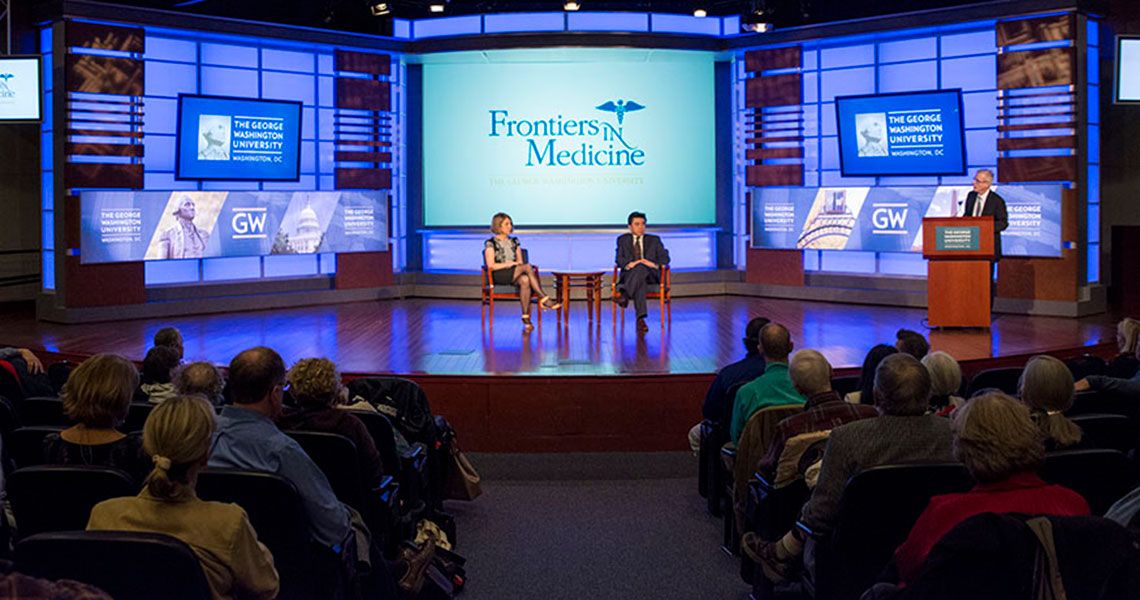One 20-ounce bottle of orange Fanta has about 73 grams of sugar, or about 19 teaspoons of sugar, which is 300 percent of an average adult’s recommended daily intake. Sugary drinks are just one of the culprits behind the obesity problem in the United States, according to Marijane Hynes, M.D., associate clinical professor of medicine at the GW School of Medicine and Health Sciences (SMHS) and founder of the GW Medical Faculty Associates’ (GW MFA) Weight Loss Clinic.
Hynes and Paul Lin, M.D., chief of the division of general surgery and vice chair of the department of surgery at the GW MFA, and associate professor of surgery at SMHS, offered two views on obesity during November’s “Frontiers in Medicine” symposium, which is designed to connect members of the Washington, D.C. community with renowned health experts at SMHS.
According to the Centers for Disease Control, more than one-third of adults in the United States suffer from obesity, and their medical costs can soar to $1,400 more a year than people who are average weight.
“This topic of obesity is one that we believe is incredibly important. There is truly an epidemic in the United States and around the world,” Alan Wasserman, M.D., chair of the Department of Medicine and Eugene Meyer Professor of Medicine at SMHS, said in introducing Hynes and Lin.
Hynes said she is passionate about trying to help patients with obesity lose weight. She started the GW MFA Weight Loss Clinic in 2009 after working with patients who had diabetes, hypertension, and asthma but she didn’t have enough time to focus on obesity — often the cause of their conditions.
Obesity affects minorities the most, and particularly women. For the latter, obesity is not just a health issue, Hynes said. Overweight women are less likely to get promoted, and they’re less likely to finish college, she explained. “No state right now has an obesity rate of less than 15 percent, which is the national goal,” she added.
Medications and lack of sleep can lead to people being overweight. “Those who sleep less than 5 hours a night eat an additional 500 calories a day,” she said. Not all disordered sleep is insomnia, according to Hynes, some of it is the result of anxiety, depression, or stress.
Goals at the clinic include helping patients achieve a decent night’s sleep, as well as working to cut unhealthy foods from their diets. Exercise and behavior change also play important roles in weight loss, Hynes said.
Self-monitoring is one of the most important steps for overweight patients to take, Hynes said. “The more self-monitoring, the more weight loss,” she said. “Be aware of what you eat, how much you exercise, and how much sleep you get.”
While patients can lose weight with the help of Hynes and other doctors, sometimes surgery is necessary. That’s where Lin comes in.
Two current operations to address obesity are gastric bypass and the sleeve gastrectomy, he said. The field of bariatric surgery really took off in the early- to mid-1990s, and now about 7 to 10 percent of the U.S. adult population qualifies in some way for weight-loss surgery. The gastric band was once the top operation for weight loss, but in recent years has been usurped by gastric bypass, which is still considered the gold standard, Lin said.
“By the late 2000s, most patients and doctors were seeing that the patients who had gastric bands, lap bands, were for the most part regaining all their weight back. They came back in and had the bands taken out to opt for gastric bypass,” he said.
To be considered for surgery, patients must have a body mass index of at least 35 or higher, need to show that they made a dedicated effort to lose weight, and need psychiatric clearance.
With surgery, patients can lose about 50 percent of their excess weight, Lin said. If a patient started out 100 pounds above his ideal weight, then he should expect to lose about 50 pounds. Making sure patients understand that is very important, according to Lin. He added, the patient may never be thin, but losing even 50 pounds can make a difference.
That difference can include becoming diabetes free, Lin explained. Bariatric surgery is in many ways a cure for diabetes, and about 80 to 90 percent of patients can see their diabetes disappear after the operation.



